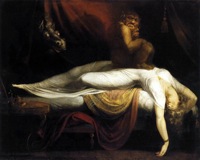Difference between revisions of "Nightmare"
m (Text replacement - "http://nordan.daynal.org" to "https://nordan.daynal.org") |
m (Text replacement - "http://" to "https://") |
||
| Line 3: | Line 3: | ||
==Origin== | ==Origin== | ||
[https://nordan.daynal.org/wiki/index.php?title=English#ca._1100-1500_.09THE_MIDDLE_ENGLISH_PERIOD Middle English], from ''night'' + ''mare'' | [https://nordan.daynal.org/wiki/index.php?title=English#ca._1100-1500_.09THE_MIDDLE_ENGLISH_PERIOD Middle English], from ''night'' + ''mare'' | ||
| − | *[ | + | *[https://en.wikipedia.org/wiki/14th_century 14th Century] |
"Nightmare" evokes the [[modern]] word for a [[female]] horse but the terms are wholly unrelated. The word derives from the [https://nordan.daynal.org/wiki/index.php?title=English#ca._600-1100.09THE_OLD_ENGLISH.2C_OR_ANGLO-SAXON_PERIOD Old English] "mare", a [[mythological]] [[demon]] who torments [[human being]]s with [[frightening]] [[dreams]]. | "Nightmare" evokes the [[modern]] word for a [[female]] horse but the terms are wholly unrelated. The word derives from the [https://nordan.daynal.org/wiki/index.php?title=English#ca._600-1100.09THE_OLD_ENGLISH.2C_OR_ANGLO-SAXON_PERIOD Old English] "mare", a [[mythological]] [[demon]] who torments [[human being]]s with [[frightening]] [[dreams]]. | ||
==Definitions== | ==Definitions== | ||
| Line 12: | Line 12: | ||
A '''nightmare''' is an unpleasant [[dream]] that can cause a strong [[negative]] [[emotional]] [[response]] from the [[mind]], typically fear or [[horror]], but also despair, anxiety and great sadness. The dream may contain situations of [[danger]], discomfort, psychological or physical [[terror]]. Sufferers usually [[awaken]] in a state of distress and may be unable to return to [[sleep]] for a prolonged period of time. | A '''nightmare''' is an unpleasant [[dream]] that can cause a strong [[negative]] [[emotional]] [[response]] from the [[mind]], typically fear or [[horror]], but also despair, anxiety and great sadness. The dream may contain situations of [[danger]], discomfort, psychological or physical [[terror]]. Sufferers usually [[awaken]] in a state of distress and may be unable to return to [[sleep]] for a prolonged period of time. | ||
| − | Nightmares can have [[physical]] causes such as sleeping in an uncomfortable or awkward [[position]], having a fever, or [[psychological]] causes such as [[stress]] and [[anxiety]]. Eating before going to sleep, which triggers an increase in the [[body]]'s [[metabolism]] and [[brain]] activity, is a potential [[stimulus]] for nightmares. Recurrent nightmares that can [[interfere]] with sleeping patterns and cause [ | + | Nightmares can have [[physical]] causes such as sleeping in an uncomfortable or awkward [[position]], having a fever, or [[psychological]] causes such as [[stress]] and [[anxiety]]. Eating before going to sleep, which triggers an increase in the [[body]]'s [[metabolism]] and [[brain]] activity, is a potential [[stimulus]] for nightmares. Recurrent nightmares that can [[interfere]] with sleeping patterns and cause [https://en.wikipedia.org/wiki/Insomnia insomnia] may require [[medical]] help.[https://en.wikipedia.org/wiki/Nightmare] |
[[Category: Psychology]] | [[Category: Psychology]] | ||
Latest revision as of 01:27, 13 December 2020
Origin
Middle English, from night + mare
"Nightmare" evokes the modern word for a female horse but the terms are wholly unrelated. The word derives from the Old English "mare", a mythological demon who torments human beings with frightening dreams.
Definitions
- 1: an evil spirit formerly thought to oppress people during sleep
- 2: a frightening dream that usually awakens the sleeper
- 3: something (as an experience, situation, or object) having the monstrous character of a nightmare or producing a feeling of anxiety or terror
Description
A nightmare is an unpleasant dream that can cause a strong negative emotional response from the mind, typically fear or horror, but also despair, anxiety and great sadness. The dream may contain situations of danger, discomfort, psychological or physical terror. Sufferers usually awaken in a state of distress and may be unable to return to sleep for a prolonged period of time.
Nightmares can have physical causes such as sleeping in an uncomfortable or awkward position, having a fever, or psychological causes such as stress and anxiety. Eating before going to sleep, which triggers an increase in the body's metabolism and brain activity, is a potential stimulus for nightmares. Recurrent nightmares that can interfere with sleeping patterns and cause insomnia may require medical help.[1]
